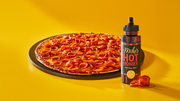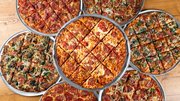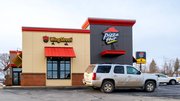Article
How one independent pizzeria survived growing pains
Getting noticed is a challenge, you have to offer something truly great and differentiate yourself in several ways, says CEO of Louisville-based Loui Loui's.

January 12, 2015 by Nicole Troxell — Associate Editor, Networld Media Group
An estimated 60 percent of restaurants go out of business within their first three years, most of them shuttering in Year One. This past spring, Louisville, Kentucky-based Loui Loui's officially celebrated its first anniversary. So far, so good.
Loui Loui's Detroit-style product features tomatoes from Italy and a proprietary cheese blend. PizzaMarketplace recently had the opportunity to chat with CEO Mike Spurlock about how his independent concept has survived the growing pains and established a hold in the market.
PizzaMarketplace: Why did you choose Detroit-style pizza as opposed to the more popular New York or Chicago styles?
MS: I grew up in Detroit as a kid and moved to Louisville when I was 11. I grew up on a fairly deep dish style of pizza they've been making in the Detroit for almost 70 years. I love that pizza and would go to one of three pizza places every time I visited. I started making my own pizza over 10 years ago and started really working on my own Detroit Style pie about 5-6 years ago, in part to satisfy a sick friend's cravings for this pizza.
Coincidentally, a Detroit-based pizza maker who has become my good friend, Shawn Randazzo, took top honors in the International Pizza Challenge in Las Vegas in 2012. I was already thinking of starting my own Detroit style place when I read about him. I thought, “Hey, maybe the rest of the world really is ready to embrace Detroit style pizza.”
PizzaMarketplace: What kind of marketing did you do to introduce people to Detroit-style pizza?
MS:Prior to opening our restaurant, I hooked up with some local food writers and gave them my story. That led to blogs and newspaper articles about us, and that was enough to get the ball rolling. The hard part in this business is keeping the ball rolling once the newness wears off. That's where you need a strategy for creating and maintaining visibility. You also have to be ready to spend some money on advertising.
But I think the most important way to market is through your customers – creating and retaining a loyal base of customers and constantly giving them reasons to sing your praises provides more bang for the buck than continuous advertising. Advertising gets new customers in the door; a fantastic experience will bring them back. Everything has to revolve around making the customers feel special.
PizzaMarketplace: What have you learned from starting a business from scratch?
MS: Before I even wrote my business plan, I made a lot of pizza at home. I had parties and invited everyone I knew to try my pizza. I started getting invited to make pizza in other people's kitchens for parties and charity events. I was constantly getting comments from true blue New York and Chicago style pizza fans that my pizza was the best they had ever tasted. This gave me confidence that the concept had legs. I gathered feedback, made improvements and started building a fan base before I even wrote my plan.
Any business should start with a plan, a very detailed plan reflecting extensive research and covering numerous sensitivities (scenarios and contingencies). Do your research, survey the market thoroughly, develop the plan. Get help if you don't have the expertise in unfamiliar areas, including business planning, financial projections, etc. As soon as planning meets reality, be prepared to adapt quickly, but stick to your mission.
After spending almost 30 years in the corporate world thinking I knew everything, spending two years in the restaurant business made me realize I don't know nearly as much as I thought I did.
PizzaMarketplace: What are some of the hurdles you’ve faced?
MS:Going into a clearly established market and throwing down a serious challenge to the status-quo is a big gamble. Louisville is traditionally a thin-crust town with a few notable exceptions. I'm surrounded by good independent pizza makers and chains.
Getting noticed is a challenge; you have to offer something truly great; differentiate yourself in several ways. We compete on quality in our food and drink, our upscale casual atmosphere and in our commitment to a customer-centric culture. Staying the course and avoiding distractions has also been a challenge.
PizzaMarketplace: What are some things you’ve had to change or do over?
MS: I had to re-do many of my assumptions right away, particularly with respect to the labor market and the appeal of our menu. I hired people with experience to help us get started, but we should have done more extensive reference and background checks because all but three of our initial hires did not pan out.
When we created our initial menu, we complicated things by offering various portion sizes that probably didn't make sense. This caused confusion among our customers and our staff about how to order, and it created issues in the kitchen with getting the right food out to the table. We made a lot of mistakes.
PizzaMarketplace: What are some tips or advice for those starting a restaurant?
MS:Be present, plan and refine incessantly, understand your marketplace, hire the best people (look for “Freds,” as in the book The Fred Factor), obsess over quality, and do not compromise on your value proposition.
Surrounding yourself with good people is vitally important. I often start an interview with “I'm looking for someone who is trustworthy, loyal, friendly, courteous, kind, obedient, cheerful, thrifty, brave, clean, a Boy or Girl Scout.”
It sounds kind of goofy when you say it like that, but I say it to be very clear about the kind of people we want to hire – others need not apply. Experience counts, but character is what really counts. These employees have to take the absolute best care of your customers, or they will destroy your business. I try to surround myself and our customers with these sorts of people. They hold the key to our success.
PizzaMarketplace: What are some tips/takeaways for surviving your first year?
MS:I was shocked to learn from a consulting chef that 75 percent of restaurants haven't documented their recipes, nor have they analyzed their food cost. Document everything – processes, recipes, food cost, policies and procedures. Don't reinvent the wheel.
There are great resources from sites like www.restaurantowner.com. With respect to those processes, constantly evaluate work flow effectiveness and efficiency, and follow the continuous improvement loop: plan, do, check and act.
You should also capture and analyze statistics about everything – your POS system should contain a wealth of this information if set up and used properly. You're building a business – process consistency, food quality and cost management is imperative to survival.
And speaking of survival, make sure you have plenty of working capital to survive the ups and downs, because they will come. Don't compromise on quality or on how you differentiate yourself in the marketplace. Sometimes it just takes time for a concept to “burn into” the public's consciousness. Stay on message, and do not waiver. Be careful changing things so that you don't confuse people, and when you do change things, over communicate. We learned about this the hard way, and it cost us.
PizzaMarketplace: It seems independent stores are losing market share – what’s your take on this? How do you compete when less capital is opening up to independents?
MS:It's completely understandable and not unique to our industry. Chains have the capital to invest in mobile and other tech that is hot right now. I'm a former technology executive, and I can tell you that it's not cheap to build really good mobile applications that integrate flawlessly with your POS, phone and back office systems.
Mobile is everywhere. I think the combination of this and integrated customer relationship management systems create convenience and loyalty programs. This enables gathering of significant useful customer data, making the difference for chains and better funded regional restaurants. This gives them a competitive advantage, and it must because these companies compete on speed and price, not necessarily on our notion of quality or innovation.
But like all technology, the price comes down, and the functionality goes up over time. Some of these technologies are becoming more mainstream and affordable. It won't be long before everyone will have them. So until then, the independents should keep doing what we're best at: being cool, funky, unconventional, innovative and creative.
Go to the independent pizzerias around the country to find the true originals. When you see an interesting pizza advertised by some chain on TV, they probably didn't invent it. They just commoditized it (mass produced and drove the price down). And that's fine with me -- that's the business they are in.
I also think the fast casual concept is partly responsible for the erosion of independents' market share – these chains are popping up everywhere because life is moving at an unprecedented pace and it's becoming harder and harder for families to actually take the time to sit in a nice restaurant and enjoy a meal together. To meet that challenge, we independents need to do a better job with the speed part of what we do. Nevertheless, I am undeterred in our mission. Independent owners and operators need to keep the faith. We are the heart of soul of the industry.
 ChatGPT
ChatGPT Grok
Grok Perplexity
Perplexity Claude
Claude








